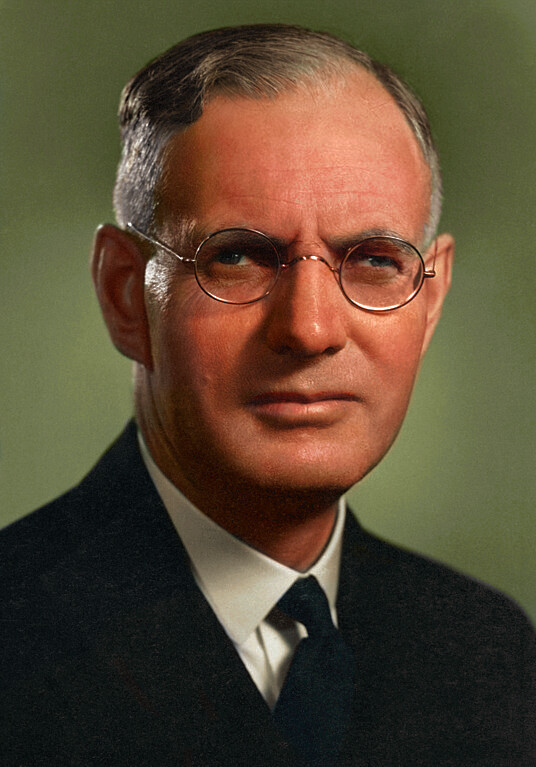Daily News (July 5, 1945)
John Curtin dies
CANBERRA – John Curtin, Prime Minister of Australia, died peacefully in his sleep this morning. He was 60.
Death of the plain Australian who had led Australia through her darkest years to the dawn of victory was announced by Acting Prime Minister Forde. “The life of the Prime Minister came to an end peacefully and without pain in his sleep at 4 a.m. today," Mr. Forde said.
Apart from the nurse who was on duty at the Lodge, Mrs. Curtin was the last person to see Mr. Curtin alive.
Shortly before midnight, she had a cup of tea with him. With a smile, he then said to her: “Go on, Mrs. Curtin, it’s best that you go off to bed now."
Mrs. Curtin went to bed in an adjoining room but did not sleep. She was with the Prime Minister when the last moments came but he died without waking.
In the early hours before dawn, Mr. Curtin’s medical adviser was summoned to the Lodge by the nurse. But Mr. Curtin was dead.
Sergt. John Curtin, the Prime Minister’s only son, was at the Lodge. Mr. Curtin’s only daughter Elsie (Mrs. J. Cole), who is in Perth, was informed by telephone early this morning.
Mrs. Cole was to have left Perth for Canberra by a Service plane early today but, when the news came of her father’s death, the flight was cancelled.
Originally Mrs. Cole was to have left by tomorrow’s mail plane but news from Canberra yesterday caused plans for the earlier departure.
Says goodnight
Few people were allowed to see the Prime Minister over the closing days.
Mr. Ray Tracey, who has been chauffeur to every Prime Minister since the last war and who was Mr. Curtin’s invariable billiards opponent when the Prime Minister was living alone at the Lodge, was one of the last when he went to the Prime Minister’s bedroom to say goodnight.
“How are you, Ray?" Mr. Curtin asked. Then he added: “I’ve had a tough day today."
Mr. Curtin then smiled, bade Tracey goodnight.
Governor-General the Duke of Gloucester, who is visiting operational areas, will return to Canberra immediately.
News was also flashed to General MacArthur, who had become a firm friend of Mr. Curtin.
Efforts are being made by the government to inform External Affairs Minister Dr. Evatt, who was scheduled to leave San Francisco by ship on Tuesday.
Mr. Curtin is the second Australian Prime Minister to die in office.
The first was Mr J. A. Lyons, who died in April 1939.
Shock
Though bulletins this week on Mr. Curtin’s health had been ominous, the dramatic radio announcements this morning of his death left listeners shocked and bewildered with a sudden sense of personal loss and tragedy.
Newspaper offices were besieged with telephone calls to confirm the news and throughout the city, conversation was only on one topic – the passing of the man who was the friend of all Australians.
After the first radio announcement at 6 a.m., all commercial broadcasting stations suspended advertising for two hours and played appropriate music with tributes to Mr. Curtin.
Serious illness first overtook Mr. Curtin in November last year, when he had a heart attack brought about by the strain and responsibility of wartime leadership.
He went into Mercy Hospital, Melbourne, where he stayed ten weeks.
Early this year, less than three months after his heart attack, Mr. Curtin resumed his official duties at Canberra and attended the opening of Parliament on February 21.
Appearing to be well on the road to recovery, Mr. Curtin attended practically every sitting of Parliament until near the end of April, when he had a relapse and was admitted to a private hospital in Canberra on April 24 suffering from congestion of the lungs.
He left hospital on May 22 and was at the Prime Minister’s Lodge until his death.
Left school at 14
Mr. Curtin was slightly under six feet in height, with thinning greying hair.
Although he finished schooling at 14, intense study up to 30 left him with an astigmatism of the left eye.
Mr. Curtin’s first job was as “printer’s devil" at 14 on papers produced by the famous Lindsays of Creswick.
Since he entered public affairs, Mr. Curtin travelled about 250,000 miles, but he made only six plane journeys.
He covered Australia scores of times and in 1924 visited Geneva and South Africa and in 1944 went to Britain, the United States and Canada.
Royal sympathy
The Duke and Duchess of Gloucester have sent personal messages of heartfelt sympathy to Mrs. Curtin and her family.
Messages read–
From the Duke:
I am deeply distressed to hear of your bereavement. I feel it as a personal loss to myself and a shattering blow to Australia and the Empire. My sincerest and heartfelt sympathy.
From the Duchess: “I send my heartfelt sympathy to you and your family in your great sorrow.”
